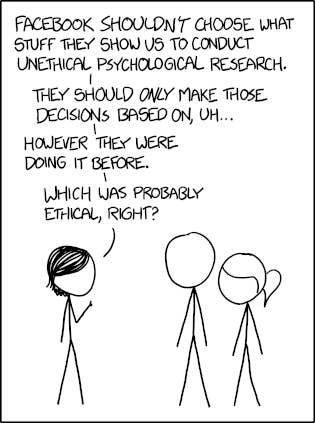
How are you feeling post-election? Do the majority of your friends feel similarly? Does it feel like the country is fully polarized with two warring sides?
Here’s a reality check: the popular vote was split almost evenly between Donald Trump and Hillary Clinton, so America doesn’t overwhelmingly support one candidate over another. And while the news coverage often makes it sound like there’s a fiery war between two political camps, nearly half the country didn’t vote at all.
Now, think about your information consumption - if you supported a presidential candidate, how often did you hear directly from people who supported someone else? Seeing posts from that one friend who consistently shares David Duke’s most appalling statements doesn't count as hearing directly from Trump supporters. How many non-voters did you hear from?
The 2016 presidential race highlighted our echo chambers like no other. When entire worlds don’t communicate with each other at all, everyone is left with a distorted sense of public opinion and of their fellow citizens.

I’m not suggesting that our information diets should (or can) perfectly represent the country or world as a whole, but we do need to be careful about getting blinded by our bubbles. There’s a danger in the absence of direct contact with demographics outside your own, and in relying on stereotypes from afar. There’s a danger in holding a severely distorted view of reality, and in developing a skewed sense of what is obvious to “everyone”.
We live in a downright bizarre information ecosystem right now. 44% of U.S. adults get news on Facebook, a platform where misinformation thrives and you can make real money seeding fake news. What people see depends on what their friends post and like, resulting in echo chambers with few overlapping perspectives.
To me, this looks like an opportunity to try something new.
What I’ll be working on
I’m a developer with a deep interest in the social ramifications of technology - for the past few years, I’ve worked at the intersection of code, data, design, and civic participation. I’m interested in how digital tools impact how we communicate, who we interact with, and whose voices get heard.
Here are a few themes I’ll be exploring:
Engineering serendipity
If you use social media, it’s likely that much of the information you encounter is from people who are very similar to you. This phenomenon goes far beyond the reductive “left vs. right” political divide, which over-simplifies the complexity of human identity. How many people in your social media feeds are more than 10 years older than you? How much variation is there in class?
The bubbles we live in are partly due to our offline networks, but also arise from tangible design and engineering decisions - optimizing your feed for likes and clickthroughs and recommending people who share your interests ensures that you won’t see much content you don’t like, or meet many people who don’t share your interests.
I will be working on ways to foster the opposite of an algorithmically constructed silo: serendipity. Are there ways to actively seek more diversity in the voices we are exposed to? How can we encounter strangers in a way that is safe and playful, without veering right into the gutter? And can that make us more patient with others? More empathetic?
Amplifying under-represented voices
Echo chambers aren't the only phenomenon distorting the information we see.
One could argue that social media democratizes information - for the most part, anyone can dive into Twitter and start sounding off. However, that does not mean that everyone has the same propensity to speak up or the same power to be heard. Much of social media is functionally a shouting chamber that privileges the loudest voices. Unsurprisingly, Twitter and other networks are struggling with patterns of abuse that consistently silence some groups more than others.
Meanwhile, the media has its own issues in whose voices are amplified and who’s ignored. Newsrooms value unpaid internships, systematically selecting for people who have outside financial support and disadvantaging minorities. Journalists are concentrated in cities on the coasts, and thus share collective blind spots in experiences.
What are ways we can actively push back against these systemic problems, so that it’s not the loudest or the most powerful who get heard?
Fostering participation over consumption
Clicking and reading are passive actions for an audience. If someone feels especially affirmed they might share a post and if someone feels especially angry they might comment on it, but those are still pretty limiting forms of engagement. What are other ways for media organizations to interact with their audiences? Can we find creative ways to re-frame an audience as participants? Beyond clicks and likes, I’ll be fiddling with new ways to question, contribute, and connect.
I want to hear from you
Do these ideas sound up your alley? Do you know of people, organizations, or projects with similar goals? Hit me up! You can reach me at cathy.deng@buzzfeed.com or @cthydng.

Open Lab for Journalism, Technology, and the Arts is a workshop in BuzzFeed’s San Francisco bureau. We offer fellowships to artists and programmers and storytellers to spend a year making new work in a collaborative environment. Read more about the lab or sign up for our newsletter.
